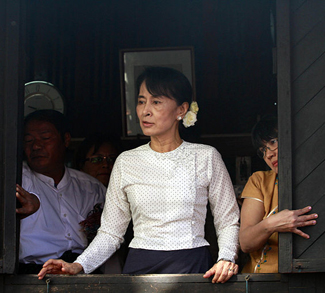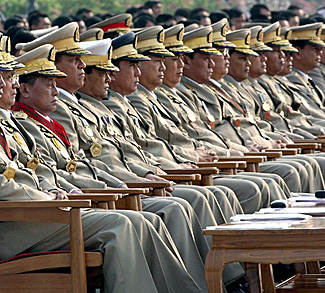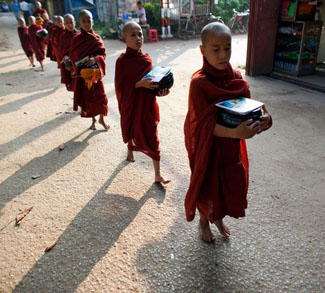Last month, the ruling party of Myanmar’s civilian government held its first general conference since taking over power from the military two years ago in a dubiously ‘democratic’ transition. Since taking office, the Union Solidarity and Development Party (USDP), led by former General Thein Sein, has struggled to present itself as representative, open, and democratically legitimate. With the wildly popular Aung Sang Suu Kyi and her National League for Democracy (NLD) sweeping every electoral contest in which they are permitted to compete, the USDP is faced with a dilemma. In order to shake off sanctions and reap the trade and investment rewards of a democratic government, they must – with the west keenly observing – prove themselves to be a truly fair, reformed, and credible government. However, if they allow open elections, they are certain to be defeated by the NLD in the next general election, scheduled for 2015.
To face these challenges, the USDP held a conference last month in Myanmar’s official capital, Naypyidaw. There, it was announced, the party would shake-up its membership, internal structure, and most importantly, its leadership, in order to woo a population which, when given the choice, has not lent its support.
The Burmese general election of 2010, in which the USDP won three quarters of the parliament, has been roundly criticized. Aung Sang Suu Kyi, considered by many to be the true national leader, was kept under house arrest until a week after the election had ended, and the NLD had not been able to participate. After this disappointing attempt at democracy, the USDP quickly set itself to dramatic gestures of reform, some of which were truly substantial, including the release of political prisoners, relaxation of censorship, and removing the ban on trade organizations.
Every stride towards liberalization and representation made by the USDP has been rewarded by the West. The United States and European Union have been warming to the idea of repealing their sanctions against trade with Myanmar, promising massive economic gains for what was recently known as the most closed-off economy on the planet.
Wishing to cultivate these benefits and gain further international credibility, the USDP held open by-elections for 45 seats in Parliament in April 2012, inviting observers from the international community, and allowing the NLD to run. The vacant seats comprised only 5% of the house, so there was never any real threat of losing power. Nonetheless, by having a supervised election featuring real opposition, the USDP could further legitimize its government by incorporating politicians such as Suu Kyi into Parliament, The NLD fared better than the USDP expected, sweeping 43 out of the 45 seats. The USDP won only one.
It became clear that the population had not forgotten about the suspicious and undemocratic general election two years earlier, nor had the release of political prisoners and relaxation of civil society bans drawn any measurable support away from “Daw” Suu (Aunty Suu, as she is affectionately known). Unless the USDP returns to improper election practices to ensure its victory in 2015, thus sacrificing economic gains and reprieves from sanctions, it would be utterly crushed in the 2015 election unless major changes were made.
This was the attitude leading up to the October conference. It was predicted that Thein Sein, President and party Chairman, might step down in favour of Vice Chairman and sometimes rival, Shwe Mann. USDP Vice Chairman, Speaker of the Burmese Parliament’s lower house and senior General to Sein under the previous regime, Mann was once thought of as a likely candidate for president after a return to civilian rule. Replacing the party leadership could portray the USDP as responsive to the public’s apparent disapproval and as a party that is willing to make major reforms.
By the end of the speeches, strategy sessions, and internal elections, the USDP emerged with some new features. Instead of a single Vice Chair position, there are now three. In addition, a three-person consultation council for the Chairman– equal in rank to the Vice Chairs – has been created.
Yet, these changes fall far short of the bold expansions and reorganizations which Mann had told the public would herald the USDP becoming a people’s party. He retains one of the three Vice Chair positions, and Thein Sein has been re-elected as Chairman. Positions have been added, but no leaders have been replaced.
It is puzzling that the USDP finished its conference without taking any steps to become more competitive against the NLD. Adding new positions without replacing any leaders will not do the trick. Certainly, there is still time before the next general election, but the statements released by the USDP before the conference- which hinted at major reform and new leadership – suggests that whatever changes they were willing to make have been made. If they did not make any significant changes to their leadership at the conference, there is little reason to suggest that they ever intend to.
This is cause for concern. Thein Sein must know that he will never have the support that Aung San Suu Kyi enjoys. This suggests either that he is bracing for a defeat, and will be willing to recognize Suu Kyi as President in two years or, perhaps more likely, that he intends to backpedal, putting a halt to the electoral openness which has not availed his party, and return to undemocratic practices. If they do so, the entire country will suffer from continued sanctions and trade restrictions.
Aung San Suu Kyi and the NLD have shown no signs of weakening, as their overwhelming victory in April’s by-elections demonstrate. The USDP conference was a chance to regroup and reorganize, which apparently, Myanmar’s present leaders are unable or unwilling to do. The course of democratic reform in Myanmar has reached a turning point. Either the government will return to familiar undemocratic practices in an effort to maintain power, or the last remnants of military rule will finally topple. The USDP has made too many attempts at credibility and has drawn too much international attention to postpone this critical moment for much longer, and the United States and EU will surely be watching closely.




